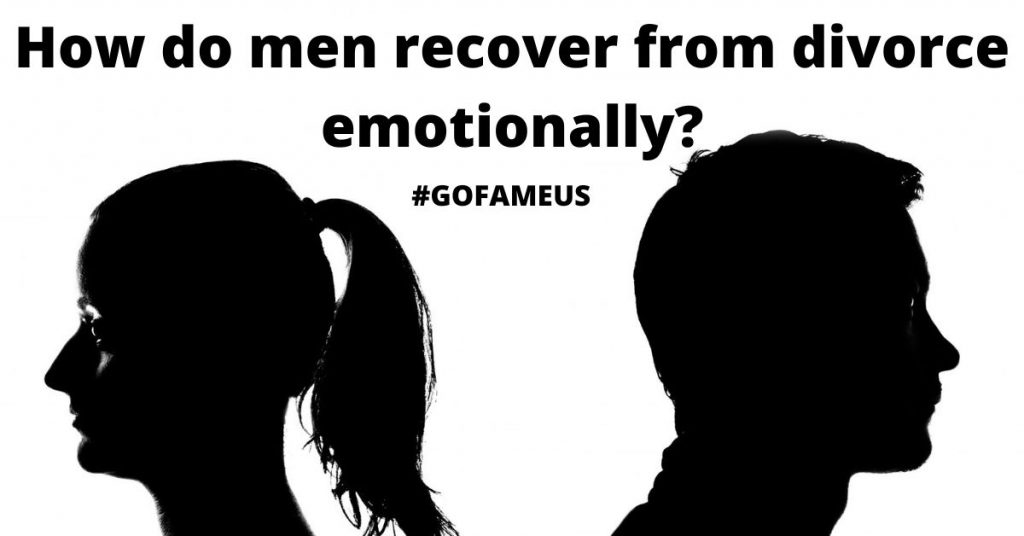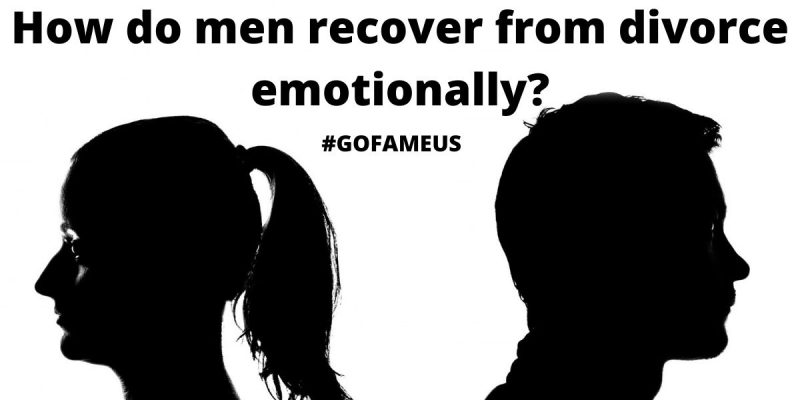There’s no right or wrong answer when recovering from divorce emotionally. Some men may find that talking about their feelings and experiences helps them heal, while others may prefer to keep to themselves. What matters most is focusing on your well-being and doing what feels best for you. There are, however, a few things that can help men recover from divorce emotionally.

Tips for Recovery
Here are six tips to get you started.
1. Understand that there is no “right” way to feel
Every man will experience divorce differently. Some may feel relief, while others may feel sadness or anger. It’s crucial to allow yourself to feel whatever emotions come up without judgment.
Understanding that there is no “right” way to feel can help you be more accepting of your emotions and experiences. You can deal with your emotions by :
- Talking to a therapist or counselor- A therapist can provide support and guidance as you work through your emotions.
- Joining a support group- Support groups provide a space for you to share your experiences and connect with like-minded people who are going through similar situations.
- Writing in a journal- Journaling can be a helpful way to process your thoughts and feelings.
Also Read: What Not to Say on a First Date?
2. Don’t try to bottle up your emotions
Expressing your emotions in healthy ways rather than bottling them up is essential. If you bottle up your emotions, they may be unhealthy, such as through anger or addiction. It is also vital to avoid numbing your emotions with alcohol or drugs.
Instead of bottling up your emotions, try to:
- Talk about your experiences- Talking to someone who will understand and support you can be accommodating.
- Find an outlet for your emotions- Some men find that exercise, creative pursuits, or leisure time in nature help them cope.
3. Focus on taking care of yourself
After a divorce, focusing on taking care of yourself is crucial. It may include eating healthy, exercising regularly, and getting enough sleep. Taking care of yourself will help you feel better physically and emotionally.
4. Seek professional help if needed
You don’t have to be a tough superhero if you’re having trouble dealing with your feelings, consider visiting a therapist or counselor. A therapist that specializes in divorce counseling can assist you in working through your emotions and learning healthy coping methods. You’ll find it helpful to talk to an outsider instead of a friend or family member that is too close to the situation.
5. Stay positive
Focusing on the positive things in your life, even after a divorce, is essential. It may include your friends, family, hobbies, or anything else that brings you joy. Focusing on the positive can help you stay motivated and hopeful during tough times.
6. Reach out for support
If you struggle to cope with your emotions, reach out to your friends and family for support. They can provide emotional and practical support, and you can join a support group or seek professional help if needed.
It may seem impossible to pick yourself up and move on after such a devastating experience, yet it is crucial to be patient with oneself and take things one day at a time. Recovery is a long process that has no defined end date. Remember that you are not alone and that help is just a phone call away.
Also Read: Experiencing Turbulence in Your Love Life? Here’s How to Save the Ship!
What to expect after divorce?
Ending a marriage is, understandably, a difficult and emotional time. You may feel sad, angry, or relieved. You may also feel like you are grieving the loss of your relationship. These emotions are expected, and giving yourself time to adjust to the change is vital.
In the days and weeks of life after divorce for men, you may find that:
- You have trouble sleeping or eating- It is common to have trouble sleeping or eating after a divorce, which may be due to stress or a change in your routine.
- You feel angry or sad- It is normal to feel sadness and anger after a divorce. These emotions may come and go, or you may feel them all at once.
- You have difficulty concentrating- The stress of divorce can make it difficult to concentrate on work, school, or other activities.
- You miss your spouse- Even if you are the one who wanted the divorce, you may still find yourself missing your spouse. It is normal and will take time to adjust to.
- You are not sure who to turn to After a divorce, you may feel like you don’t have anyone to turn to for support. It is normal, but many people can support you through this time.
- You feel like you need to start over A divorce can be a fresh start, and this may be an opportunity to pursue your dreams or try something new.
No matter how you feel after your divorce, giving yourself time to adjust to the change is vital. Recovery is a process, and there is no set timeline for healing. Remember that you are not alone, and support is available if you need it.
In conclusion
Ending a marriage is challenging and emotionally charged, and giving yourself time to adjust to the change is essential. Recovery is a process, and there is no set timeline for healing. Remember that you are not alone, and support is available if you need it.




